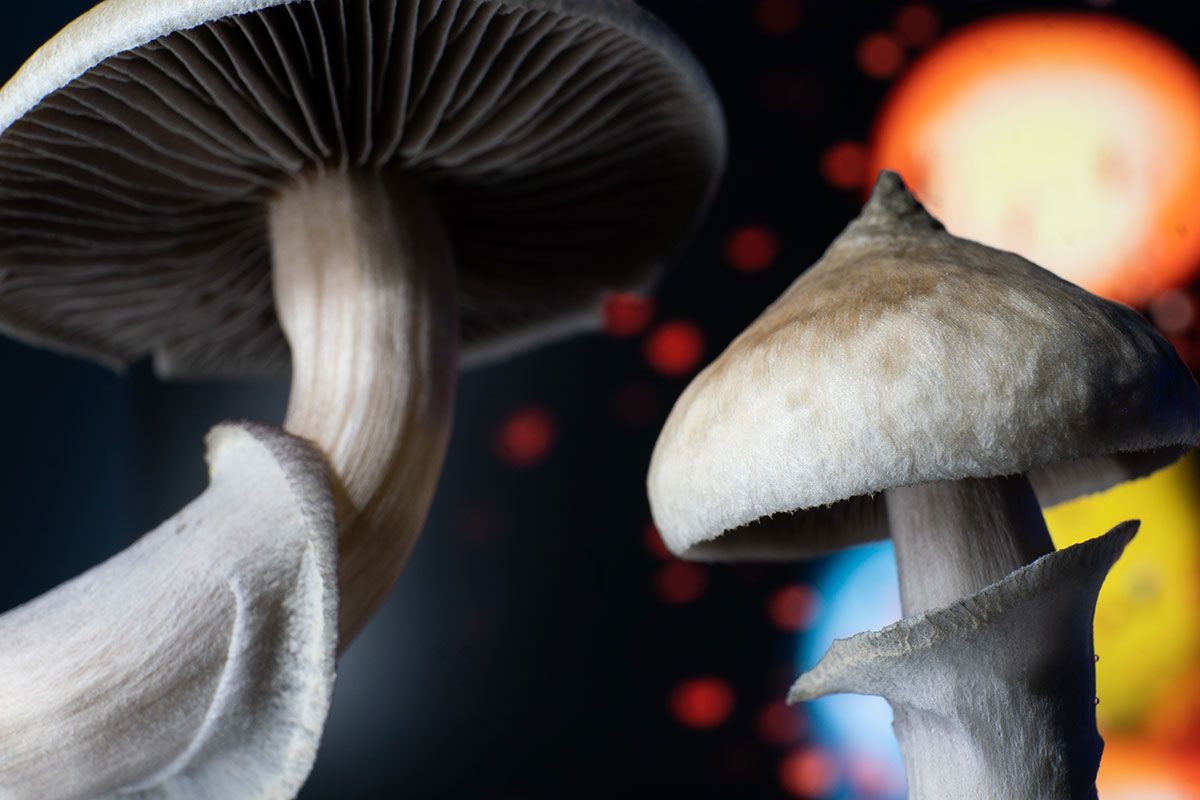Psilocybin has the potential to help so many people, in ways we are only just now beginning to understand. New evidence supports psilocybin’s uses in anxiety, depression, PTSD, and more. Could psilocybin be an answer for millions of people suffering from anxiety and other mood disorders? Let’s get into what we know about psilocybin therapy for anxiety.
The pandemic has piled more stress and anxiety onto our global population, where rates of mental health problems were already on the rise. The two most common disorders, depression and anxiety, make up a bulk of mental health problems [1]. They’ve also shown to be responsive to psilocybin therapy.
Psilocybin has been used by native peoples for rites of passage and spiritual experiences since prehistoric times. In the last few decades, western research has turned to psilocybin amidst failings in our mental health systems and massive medication dependence. There are several treatment gaps that psilocybin has the potential to fill, and sooner than we think.
First, let’s talk about a few areas of anxiety that psilocybin therapy has already shown to be effective for in clinical trials.
Follow your Curiosity
Sign up to receive our free psychedelic courses, 45 page eBook, and special offers delivered to your inbox.Psilocybin Therapy for Anxiety in Terminal Illnesses and Cancer
Some of the best research we have for psilocybin and anxiety is from patients suffering from life-threatening and terminal illnesses, such as cancer and AIDS.
For these people, anxiety and depression can seem inevitable. While medicine tends to put a lot of research towards physician symptom management, we have few treatment options for psychological illness. But mood disorders have real implications not only for mental health but for prognosis and physical outcomes.
Nearly 40% of cancer patients have symptoms of at least one mood disorder [2]. Depression and anxiety are associated with worse adherence to treatment, decreased quality of life, and risk for suicidality in this population [3]. Independently, depression has been shown to increase risk for death among cancer patients [4].
In 2016, a double-blind trial investigated psilocybin as a treatment for existential anxiety and depression for people with cancer [5]. Participants were given one of two doses in two separate sessions. They were supervised during sessions and had their vital signs taken at intervals. Afterwards, researchers followed up by evaluating several scores measuring anxiety and depression.
Psilocybin markedly decreased psychological distress in this population. This change was measured both through self-reporting and clinician evaluation.
Participants experienced better quality of life, life meaning, death acceptance, and optimism. Even six months after their sessions, these positive effects sustained. More than 80% of participants said that their well-being and life satisfaction were moderately or greatly improved.
These results show psilocybin’s potential to lessen or relieve the intense psychological suffering and anxiety of a population grappling with pain and death. If these results persist in subsequent research, we should implement them as soon as possible.
Psilocybin Therapy for Attachment Anxiety
Recently, psilocybin therapy also showed effectiveness at relieving some symptoms of attachment anxiety.
Attachment insecurity typically begins early in life, and is characterized with less ability to trust and less willingness to explore. Anxiety manifests around attachment itself but also in avoiding attachment. It’s a specific form of anxiety that affects people’s relationships and ability to bond and connect with others in a stable way.
A small 2020 study used a population of males with long-term AIDS diagnoses, who also had moderate to severe attachment anxiety [6]. These participants went through a combination of group therapy with one psilocybin session. Researchers measured attachment insecurity before and throughout the study period.
After three months, participants reported significant improvement in their attachment anxiety. Therapy did not have the same marked effects on the attachment avoidance component.
This was a limited study, but it illuminates a promising area for future research. Larger studies of more diverse groups will give us stronger evidence on psilocybin therapy for attachment anxiety.
Psilocybin Therapy for Adolescent Anxiety
We have some early evidence for psilocybin’s ability to relieve specific anxieties in young adults. This is a vulnerable population, and much more research is needed on this subject. Clinical trials of psilocybin are currently only legal for people over 18. For now, a recent case study out of Croatia has shed light on this new area for psilocybin therapy.
Anxiety is very common among adolescents and young adults, leading to social and behavioral problems and even life-long impairments. According to the National Institute of Health, 1 out of every 3 young adults suffers from anxiety today [7].
This case study, published in October 2021, focused on a single 16-year-old male [8]. He was being seen in a psychiatric clinic for isolating himself from his peers, intense anxiety, and falling school performance. He struggled with a learning disability, as well as lack of motivation for school work. After attempting group therapy, he found he was too anxious to participate and found no improvement.
After three psilocybin experiences over 18 months, he experienced big positive changes. His anxiety fell, and he was able to communicate with his peers and teachers. He expressed his emotions, participated in group therapy, and reported improved connections with people.
These results were life-changing for this young adult. Drastic improvements in personality and mindset have not been seen with psychotherapy treatment alone.
The nature of a case study means that these results are very limited. But this adolescent’s experiences can’t be discounted among the mounting evidence that psilocybin could be helpful for anxiety. With the rising rates of adolescent anxiety and depression, could psilocybin be a means of relief for this vulnerable group?
How Does Psilocybin Therapy Work?
It’s becoming more clear that psilocybin therapy could be a life-changing option for people with anxiety and depression. As with many other treatments, it’s still not totally clear how psilocybin works. Here’s what we know so far.
The philosophy of psychedelic medicine is different from medication therapy. Pharmacological therapy relies on physiological processes to improve psychological symptoms, requiring repeated administration of a drug to maintain these effects.
Psychedelic therapy creates emotional experiences, which give people new perspectives in their lives and can alter personality. Mystical experiences during psychedelic sessions lead to long-term attitude, spiritual and mood adjustments [9].
In the case of anxiety, psilocybin therapy works at the neurological root of anxious emotions. During psilocybin experiences, the nucleus accumbens and prefrontal cortex have higher concentrations of serotonin and dopamine. This activation gives people a soothing, comforting feeling that “everything will be fine” [10].
Even though the session ends, patients are left with this soothing memory, which gives them new perspective. This is one of the ways we believe psilocybin therapy could re-wire the anxious brain.
Evidence is strong that psilocybin could improve the lives of millions of people suffering from anxiety. In a 2020 meta-analysis, 4 studies showed that psilocybin’s effects were large and statistically significant [11]. Another systematic review of meta-analysis of clinical trials also showed that psilocybin could reduce depression and anxiety [12].
These results are encouraging, and have helped create a foundation for future study. Now let’s discuss future areas of research, and more steps to take before we can implement psilocybin therapy for anxiety.
New Directions in Psilocybin Therapy
We’re looking forward to more research into psilocybin therapy for anxiety. Here are a few avenues that new studies will improve on:
- Study size: Most of the research in psilocybin therapy for anxiety has been preliminary small-scale studies. A recent double-blind study of psilocybin and depression included over 200 people. We hope to see more large, high-quality research like this in the near future.
- Efficacy: While we have good evidence so far for psilocybin’s safety, double-blind comparison studies will tell us more about how psilocybin stacks up against standard treatments for anxiety.
- Mechanism of Action: As with many medications, we still have more to learn about how psilocybin works in the body and mind. Future research will hopefully give us more information about psilocybin’s experiential power.
An obvious problem is psilocybin’s Schedule1 classification under the FDA. Breakthrough designations have already been made, both for psilocybin in treatment-resistant depression, and MDMA for PTSD.
In the short term, another breakthrough designation could be helpful for cancer patients suffering from existential anxiety. In the long term, psychedelics will need to be de-scheduled before we will see widespread treatment. This could happen at any time. The more evidence we gain about psilocybin’s safety and efficacy, the closer we get to de-scheduling.
Depending on your location, psilocybin therapy may be available to you sooner than you think. Oregon recently passed a new bill that will legalize and promote supervised psilocybin sessions for anyone over 21. A similar measure in Colorado aims to decriminalize psilocybin therapy this year [13].
Even once psychedelics are no longer illegal, patients who could benefit from psilocybin therapy will need trained and licensed therapists to facilitate sessions and integration. Getting more therapists trained and skilled is another way to expand the field of psychedelic therapy and increase the pressure to de-schedule psilocybin.
We’re excited about psilocybin’s ability to help millions of people improve their lives. If you’re a clinician or just someone curious to learn more about evidence-based psychedelic therapy, take a look at our free courses or enroll in our 9-hour psilocybin course. For more news and information about psychedelic therapy, check out our articles page.
References:
- The Lancet Global Health (2020). Mental health matters. The Lancet. Global health, 8(11), e1352. https://doi.org/10.1016/S2214-109X(20)30432-0
- Mitchell AJ, Chan M, Bhatti H, Halton M, Grassi L, Johansen C, Meader N. Prevalence of depression, anxiety, and adjustment disorder in oncological, haematological, and palliative-care settings: a meta-analysis of 94 interview-based studies. Lancet Oncol. 2011 Feb;12(2):160-74. doi: 10.1016/S1470-2045(11)70002-X.
- Arrieta O, Angulo LP, Núñez-Valencia C, Dorantes-Gallareta Y, Macedo EO, Martínez-López D, Alvarado S, Corona-Cruz JF, Oñate-Ocaña LF. Association of depression and anxiety on quality of life, treatment adherence, and prognosis in patients with advanced non-small cell lung cancer. Ann Surg Oncol. 2013 Jun;20(6):1941-8. doi: 10.1245/s10434-012-2793-5.
- Arrieta O, Angulo LP, Núñez-Valencia C, Dorantes-Gallareta Y, Macedo EO, Martínez-López D, Alvarado S, Corona-Cruz JF, Oñate-Ocaña LF. Association of depression and anxiety on quality of life, treatment adherence, and prognosis in patients with advanced non-small cell lung cancer. Ann Surg Oncol. 2013 Jun;20(6):1941-8. doi: 10.1245/s10434-012-2793-5.
- Griffiths, R. R., Johnson, M. W., Carducci, M. A., Umbricht, A., Richards, W. A., Richards, B. D., Cosimano, M. P., & Klinedinst, M. A. (2016). Psilocybin produces substantial and sustained decreases in depression and anxiety in patients with life-threatening cancer: A randomized double-blind trial. Journal of psychopharmacology (Oxford, England), 30(12), 1181–1197. https://doi.org/10.1177/0269881116675513
- Stauffer, C. S., Anderson, B. T., Ortigo, K. M., & Woolley, J. (2020). Psilocybin-assisted group therapy and attachment: Observed reduction in attachment anxiety and influences of attachment insecurity on the psilocybin experience. ACS Pharmacology & Translational Science, 4(2), 526–532. https://doi.org/10.1021/acsptsci.0c00169
- U.S. Department of Health and Human Services. (n.d.). Any anxiety disorder. National Institute of Mental Health. Retrieved January 6, 2022, from https://www.nimh.nih.gov/health/statistics/any-anxiety-disorder#part_155096
- Bogadi M, Kaštelan S. A potential effect of psilocybin on anxiety in neurotic personality structures in adolescents. Croat Med J. 2021;62(5):528-530. doi:10.3325/cmj.2021.62.528
- Garcia-Romeu A, Griffiths RR, Johnson MW. Psilocybin-occasioned mystical experiences in the treatment of tobacco addiction. Curr Drug Abuse Rev. 2014;7(3):157-64. doi: 10.2174/1874473708666150107121331.
- Bogadi M, Kaštelan S. A potential effect of psilocybin on anxiety in neurotic personality structures in adolescents. Croat Med J. 2021;62(5):528-530. doi:10.3325/cmj.2021.62.528
- Simon B. Goldberg, Brian T. Pace, Christopher R. Nicholas, Charles L. Raison, Paul R. Hutson,The experimental effects of psilocybin on symptoms of anxiety and depression: A meta-analysis, Psychiatry Research, Volume 284, 2020, 112749, ISSN 0165-1781, https://doi.org/10.1016/j.psychres.2020.112749.
- Vargas AS, Luís Â, Barroso M, Gallardo E, Pereira L. Psilocybin as a New Approach to Treat Depression and Anxiety in the Context of Life-Threatening Diseases—A Systematic Review and Meta-Analysis of Clinical Trials. Biomedicines. 2020; 8(9):331. https://doi.org/10.3390/biomedicines8090331
- Folker, J (2021, December 16). Psychedelic therapy initiatives take step toward 2022 ballot. Law Week Colorado. Retrieved January 5, 2022, from https://www.lawweekcolorado.com/article/psychedelic-therapy-initiatives-take-step-toward-2022-ballot/







